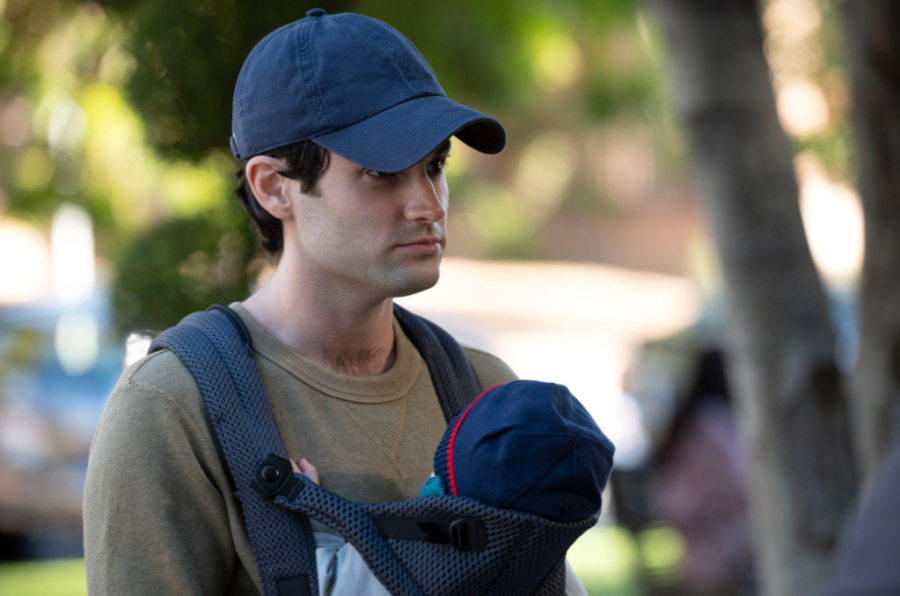Does Season 3 of Netflix’s ‘You’ Kill? So Far, Not So Much
Netflix’s highly-anticipated season 3 of “You” just released on Friday, Oct. 15.
This past Friday marked the release of the highly anticipated third season of Netflix’s “You,” a psychological drama that started in 2018 starring Penn Badgley and Victoria Pedretti. This season revolves around the serial-killing couple’s new life in the suburbs of San Francisco. After watching the first three episodes to get a feel of what to expect, I’m sad to say the only thing they killed this season were my hopes for the direction of the show.
“You” is based on a book series by Caroline Kepnes that follows Joe Goldberg (Badgley) who is an obsessive stalker-turned-serial-killer, now married with a newborn son Henry to Love Quinn (Pedretti). The irony of the plot is that Love also happens to be a serial killer, much to his hypocritical repulsion.
As they start their new life in what Joe refers to as a “white-picketed hell,” they struggle to successfully navigate all the emotions onset by parenthood and marriage without taking innocent lives. Within the first episode, Love already took an axe to their neighbor Natalie for making a move on Joe and threatening the prosperity of her new family. This grave act of pettiness and impulse defies Joe’s commitment to being better for the sake of Henry, and sets precedence for the season to encompass the chaos of their killings and coverups.
Toward the end of the last season, I was already beginning to grow exhausted with the plot. Joe’s murders were getting sloppy. It seemed as though the creators of the show, Greg Berlanti and Sera Gamble, kept adding new people to the spider web of conflict to stay exciting, which is what all dramas do, but the rate in which they did so felt rushed and unnatural.
Season 3 so far is panning out to be just the same, which leaves me feeling as though I’m watching the same conflict just with different characters. The only distinction is that instead of Joe being the one with sloppy killings, now Love is responsible. Instead of just Joe desperately scrambling to cover his “mistakes,” the two of them do it together.
Despite the redundancy of the plot, the season still possesses admirable qualities. For one, I cannot get enough of the way the show includes voiceovers of Joe’s internal reactions to his situations. When describing his dedication to his falsely anticipated newborn daughter, he said, “For her, I moved to some soulless, wealthy suburb outside San Francisco. For her, I’d marry the monster, her mother. For her, I’d lock myself into this prison.”
The way he describes situations as they unfold is vivid and humorous, sometimes so much so I forget he’s a serial killer and actually take a liking to him for a split second. The vocalization of his inner thoughts also highlights his false ideology of thinking his crimes are more justifiable than Love’s. He consistently views her as immoral and insane, even though he is no different.
Another aspect of “You” Season 3 that I appreciated despite overall disappointment of the plot’s repetitiveness is the attention the show brings to specific issues that are relevant to current society. The blatant classism and superficiality of their suburban town Madre Linda is depicted through all their new neighbors. They nod to performative activism through queen bee “momfluencer” Sherry, who hosts vigils for “missing” neighbor Natalie to appear compassionate to her social media following, even though less than one episode prior she was trash-talking her at a party. “You” also highlighted the harm caused by “Missing White Woman Syndrome” as well as anti-vaxxers.
In summary, Season 3 of “You” was a flop. It lacked innovation and felt far too formulaic. Although my sentiment for Season 3 is unenthused, Netflix has already renewed the show for a fourth season, which leaves me optimistic that maybe the first three episodes were just slow. The remaining seven episodes could redeem itself, though I find it unlikely.









